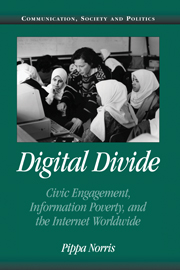Book contents
- Frontmatter
- Contents
- List of Tables
- List of Figures
- Preface
- PART I INTRODUCTORY FRAMEWORK
- PART II THE VIRTUAL POLITICAL SYSTEM
- 5 Theories of Digital Democracy
- 6 e-Governance
- 7 Online Parliaments
- 8 Virtual Parties
- 9 Civic Society
- PART III THE DEMOCRATIC DIVIDE
- Appendix A Nations in the Study and Abbreviated Names Used in Figures
- Notes
- Select Bibliography
- Index
9 - Civic Society
Published online by Cambridge University Press: 05 June 2012
- Frontmatter
- Contents
- List of Tables
- List of Figures
- Preface
- PART I INTRODUCTORY FRAMEWORK
- PART II THE VIRTUAL POLITICAL SYSTEM
- 5 Theories of Digital Democracy
- 6 e-Governance
- 7 Online Parliaments
- 8 Virtual Parties
- 9 Civic Society
- PART III THE DEMOCRATIC DIVIDE
- Appendix A Nations in the Study and Abbreviated Names Used in Figures
- Notes
- Select Bibliography
- Index
Summary
The networking potential of the Internet and its ability to link transnational advocacy networks, grassroots political organizations, and the independent media around the world has aroused hopes that civic society can be nurtured and mobilized through digital technologies. “Civic society” is understood to refer to the multiple organizations buffering between citizens and the state, including parties discussed in the previous chapter, as well as the news media, traditional interest groups such as trade unions and professional associations, in addition to such alternative social movements as environmentalist organizations, the women's movement, human rights groups, and peace activists. The news industry was one of the first organization to venture online, whereas transnational advocacy networks have been among the most active organizations taking advantage of the Web for mobilizing, publicity, and interaction. Stealth protest coalitions have formed like virtual guerrilla armies around issues such as world trade, fuel taxes, and genetically modified food, then subsequently dissipated, only to reappear in different guise at a later date. But what have been the political consequences of these developments? After reviewing debates in the literature theorizing about these issues, we examine evidence comparing civic society worldwide by focusing on three questions:
Which news media, interest groups, and new social movements are online throughout the world?
What is the potential impact of online civic society on political participation, community building, and democracy?
What explains this distribution, in particular how far does democratization or technological diffusion foster the spread of civic societies on the Internet?
- Type
- Chapter
- Information
- Digital DivideCivic Engagement, Information Poverty, and the Internet Worldwide, pp. 171 - 192Publisher: Cambridge University PressPrint publication year: 2001



